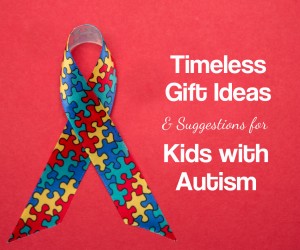28 Timeless, Trendless Thought Bytes for Gifting a Child with Autism
By Ellen Notbohm
“What kind of toys do autistic children like?”
“What should I buy for my ______ who has autism?”
Though I hear more of these questions at this time of year, they crop up in every month, in daily life and for special occasions. To the former question, I call out the generalization; the question makes no more sense than asking what kind of toys six-year-olds like, or little red-haired girls, or blue-eyed boys or kids with freckles. And to both questions, the answer is the same as it would be for any child or adult giftee—when you truly care about coming up with a meaningful gift, you have to let go of all your own preconceptions and personal preferences and focus exclusively on your intended gift recipient, a person who is one-of-a-kind. What follows are not tips or recommendations or instructions or guidelines, but rather, thought bytes to prime your imagination and perspective, and good for any day of the year, as giving should be.
In no particular order:
- Forget “with autism.” Think only about what would delight this one, individual child.
- Forget “a child.” Think only about what would delight this one, individual child.
- Think “What can I give?” which won’t necessarily translate to “What can I buy?”
- Nearly all children treasure pleasant times, memories and experiences doing what they like best.
- Ask the child what s/he likes. (Not “what toys to do you like?” or any other limiter.)
- Ask the child what s/he doesn’t like.
- Ask the child what s/he likes to do.
- Ask the child what s/he doesn’t like to do.
- Ask the child what s/he likes to read (or be read to).
- Ask the child s/he doesn’t like to read (or be read to).
- Et cetera. Whatever you ask, ask also in reverse.
- Check to make sure you understand. Mark Twain’s “darling mispronunciations of childhood” can be even more, well, pronounced in a child with autism who struggles with language, and can result in gifting mistakes that range from amusing to embarrassing.
- Let the child answer in any mode meaningful to him/her—verbalize, draw, show you on a device or book, take you someplace, sing, sign or mime.
- Ask the child’s parents about likes and dislikes.
- Ask the child’s teacher about likes and dislikes. They often see a different side of the child than what s/he exhibits at home.
- Ask the child’s siblings and peers about likes and dislikes. They often see a different side of the child than what s/he exhibits to adults.
- Ask the child’s parents, teachers and peers what sensory sensitivities to avoid.
- Observe the child in different environments. What is s/he drawn to? What does s/he avoid?
- Think twice about the “anything is better than nothing” gift. A gift that the child doesn’t understand or like can cause discomfort, confusion, anxiety, humiliation, anger. None of these feelings are “inappropriate.” They are real.
- Don’t overspend, unless that’s the example you want to set.
- Be kind but concrete and don’t leave a “maybe” impression if a gift the child requests is out of the question. To a black-and-white thinker, disappointment can damage trust.
- The purest definition of “toy” is “something to be played with.” Any object that is safe and engages the child in a way he enjoys can be a toy.
- Don’t assume the child will like a toy that is the latest trend or “hot” toy.
- Don’t assume the child will like a toy because you did as a child.
- Don’t assume you know the only “right” way to play with any particular toy. A child with autism may turn your thinking on its ear—literally and figuratively.
- Don’t be or act offended if your gift doesn’t get a second look. What doesn’t appeal now may spark interest later. Sometimes much later.
- Be aware that some wrappings, such as shiny paper, can cause visual or tactile upset for some kids with autism, or an unmanageable tangle of ribbons can trigger frustration and meltdown. This is not “bad” or “immature” behavior. It is legitimate sensory overload.
- The box and/or the wrapping may be more interesting than the actual gift.
- Here are some of the most subjective statements in the whole human existence:
“This is interesting!”
“It’s fun!”
“This smells great!”
“This is delicious!”
“That feels so good!”
Add “…to me!” to the end of those phrases and realize that a child with autism has his or her own, powerful and wholly legitimate thoughts on what is interesting, fun and tasty, and it is neither bad nor weird nor disrespectful if s/he doesn’t share your opinion.
© 2015 Ellen Notbohm, www.ellennotbohm.com



